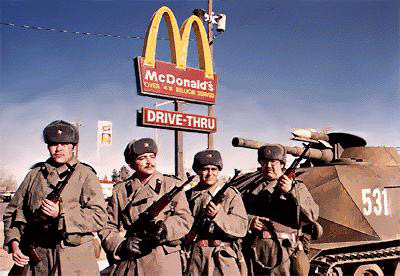What Russia Wants
Russia’s actions in Georgia are not much different from the typical conduct of other great powers—including the United States—in their neighborhoods. A few weeks before the onset of the fighting, Secretary of State Condoleezza Rice asserted that the notion of "spheres of influence" in world affairs was obsolete. That argument was either naïve or hypocritical. Certainly, Washington’s conduct in the Western Hemisphere suggests that U.S. officials have not abandoned their belief in an American sphere of influence. Since World War II, the United States has invaded and occupied the Dominican Republic, Grenada, Panama, and Haiti. Washington orchestrated a successful coup against the government of Guatemala and tried to do the same both to Fidel Castro’s regime in Cuba and the Sandinista government in Nicaragua. It is a bit much for American leaders to admonish the Russians not to molest small, hostile neighbors.
Moscow is also increasingly angry at the West’s repeated disdain for Russian policy preferences—indeed, core Russian interests—in Europe. The insensitivity of the United States and its allies was already apparent in the mid-1990s, with the effort to expand NATO by adding Poland, Hungary, and the Czech Republic. That move violated assurances given to the Kremlin when Mikhail Gorbachev’s government agreed to the reunification of Germany and continued German membership in NATO. Secretary of State James Baker assured Russian officials that the alliance would not expand eastward from Germany.
Not content with that provocation, in 2004 the U.S. pushed through NATO’s incorporation of Latvia, Estonia, and Lithuania, entities that had been part of the Soviet Union. And NATO expansion is not the only manifestation of contempt for Russia’s interests. So is Western policy in the Balkans, traditionally a key region for Moscow. In 1995, NATO forces intervened in Bosnia’s civil war to undermine the Serbs, Russia’s coreligionists and longstanding political allies. Then in 1999, the United States and its allies waged an air war against Serbia, ultimately wrenching away its province of Kosovo. They bypassed the UN Security Council to do so, thereby evading a Russian veto.
Russia may be capable of establishing a modest sphere of influence along its perimeter, but it does not have the strength to reconstitute the Soviet empire—much less pose an expansionist threat to the heart of Europe as the USSR did during the Cold War. American opinion leaders need to curb their alarmism. Moscow’s conduct in Georgia may have been brutal, but it is not out of the norm for a great power to discipline an upstart small neighbor. There is no credible evidence that Moscow has massive expansionist impulses. And even if it did, Russia lacks the power to achieve such goals. Russia is not the Soviet Union, and it certainly is not the equivalent of Nazi Germany.
- The American Conservative, September 22, 2008 Issue
The myth of Russia is built on an expansive foundation of many half-truths and hidden facts. It is a neoconservative creation. It was shaped by them to serve as an "enemy" for America, to provide some variation to the Islamic terrorist threat. Picking up from the heady days of the Cold War, American officials made the decision to fabricate the tale of a mythical totalitarian monolith that threatens the very peace and stability of the world itself.
The tense drama that was planned for this region, dreamed-up by the sick mind of Dick Cheney and his pals from the dark side over at CIA, is over. For now.
But the neoconservative remains restless, and many American pundits have plans for the Georgians, brilliant schemes designed to get Georgia into a big war with the Russians. Take this cheery article from the neoconservative Weekly Standard, for example.
The insane notion of turning Georgia into the Black Sea Hezbollah to fight the evil
But Russia is not interested in seizing Georgia, and US politicians need to accept that 1) the Cold War is over and 2) Russia has returned to the world stage as a great power. The US can no longer afford to ignore, much less trample, on core Russian interests.
[via The Young Fogey]





2 Comments:
great nation my bollocks. that regime is built on foreign investment, stolen know-how and a sheer lack of sense on the part of populace. recent Ogoniok article talks about 'caramel empire' (one that melts in the mouth and disappears). that's the one :)
HAHAHA the picture is so funny...
Post a Comment
<< Home